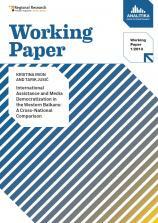
International assistance and media democratization in the Western Balkans: a cross-national comparison
This paper investigates if and how the media system in the Western Balkan was influenced by the international media assistance programs. By using the comparative approach, the report connects the phenomenon of media democratization and international media assistance and analyzes the impact of the local political context on the implementation of such assistance programs. The paper is a part of the comparative research project that studies the results of, and the challenges to the international media assistance efforts in the Western Balkan countries. It covers four countries that emerged from former federal Yugoslavia, i.e. Bosnia and Herzegovina, Kosovo, Macedonia and Serbia, as well as a fifth country, Albania.
This publication is produced within the project “Development of Functional Media Institutions in Western Balkans - A Comparative Study” implemented in 2012 and 2013 by the Center for Social Research Analitika from Bosnia and Herzegovina, in cooperation with the Center for Research and Policy Making (CRPM) from Macedonia, the Albanian Media Institute (AMI), from Albania, and the Democracy for Development (D4D) from Kosovo. The project is funded by the Regional Research Promotion Programme(link is external) (RRPP).
Tags: Media freedom Western BalkansThe content of this article can be used according to the terms of Creative Commons: Attribution-NonCommercial 4.0 International (CC BY-NC 4.0) . To do so use the the wording "this article was originally published on the Resource Centre on Media Freedom in Europe" including a direct active link to the original article page.

